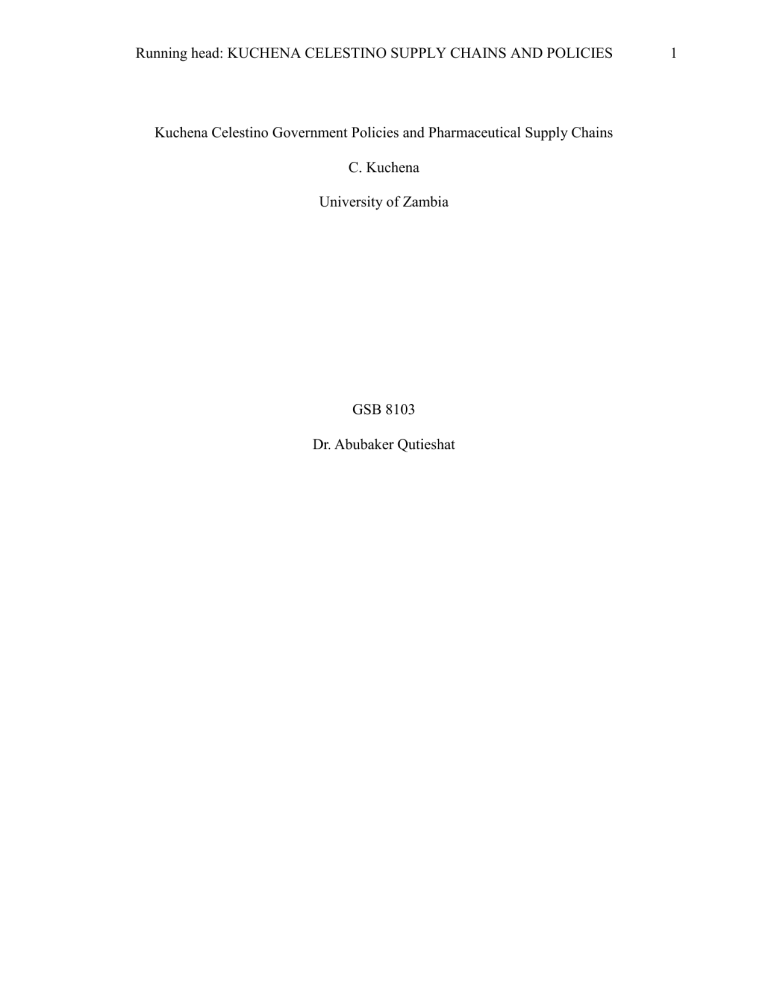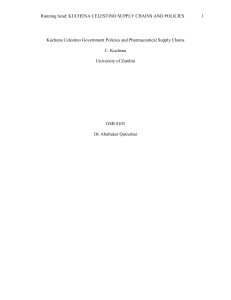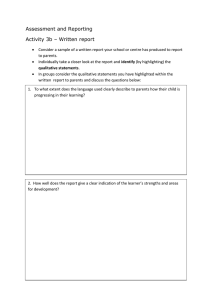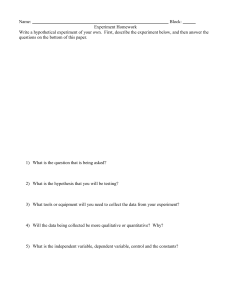
Running head: KUCHENA CELESTINO SUPPLY CHAINS AND POLICIES Kuchena Celestino Government Policies and Pharmaceutical Supply Chains C. Kuchena University of Zambia GSB 8103 Dr. Abubaker Qutieshat 1 KUCHENA CELESTINO SUPPLY CHAINS AND POLICIES 2 In the view of Cresswell and Creswell (2018), there are three approaches to research: the qualitative, quantitative, and mixed methods. The distinction between the three is not so much in absolute terms but they lie on a continuum. Qualitative methods on one end and quantitative methods on the other with mixed methods in between. A holistic way to differentiate these methds looks at the underlying philosophical assumptions held by the researchers, the nature of research strategies used in the research, and the specific methods and tools used to conduct these strategies (Cresswell &Cresswell, 2018). Quantitative research is mainly used to test objective theories by investigating the relationship among variables. It looks to find out how variations in the independent or predictor variables affect the dependent variables therefore it is deductive. The final write-up has a determined structure entailing the introduction, literature and theory, methods, results, and discussion. The mixed methods approach involves collecting both quantitative and qualitative data. This is informed by the belief that that the combination of qualitative and quantitative data elicits further awareness beyond that yielded by either the quantitative or qualitative data alone. Further along the continuum lies qualitative research. This method seeks to discover and understand the meaning individuals or groups assign to a social or human challenge. Choosing this approach implies assuming an inductive style that focuses on how individuals create meaning, and how circumstances shape this meaning from complexity. Consequently, the final write-up has a flexible structure. In summary, researchers should reflect on their ontological and epistemological ssumptions that influence their study, the research design associated with this worldview, and the particular methods or procedures of research that operationalize the approach into practice (Cresswell & Cresswell, 2018). This study is mainly motivated by the belief that people make KUCHENA CELESTINO SUPPLY CHAINS AND POLICIES 3 sense of the world as they perceive it and interact with other people in it (Berger & Luckmann, 1967). In addition, the study seeks to solve a “real-life” problem and therefore focuses on practical policy recommendations. As a result, I will vacillate between the qualitative end of the ontological spectrum to a midle-ground if the research processes demand so. My perspective According to Berger and Luckmann (1967), individuals form subjective meanings of their experiences that are multiple and varied. Resultantly, researcher are led to look out for the complexity of interpretations rather than reducing meanings into narrow categorizations. The main objective of the research is to largely depend on the participants’ perception of the circumstances under study. This study seeks to understand how individuals within organizations that are part of the pharmaceutical supply chains interprete the challenges faced by their organizations as they relate to government policies. This line of thinking requires a constructivist approach to address how organizations interact with the environment. Furthermore, having observed that organizational leaders’ views of the environment and subsequent organizational response are reliant upon each leader’s worldview, the study will focus on the precise settings in which these leaders live and work in order to comprehend the historical and cultural backgrounds of the participants. My training has largely been on the scientific approach but I have appreciated that some conflicts arise in part due to differences in the worldview. I have come to understand that a postpositivist and scientific approach to policy research masks the complexities surroundings contextual differences. With this in mind, I am concerned with understanding how organizational leaders of pharmaceutical wholesalers and manufacturers in Zimbabwe conceive of the challenges they face as well as potential solutions. The challenges are those they feel are KUCHENA CELESTINO SUPPLY CHAINS AND POLICIES 4 associated with government policies. They may have been brought about by policies being implemented, or are avoidable if certain policies are implemented or both. This is an inductive study that will seek to understand the opinions of the research participants and gain a pattern of meaning. Research Approach In speaking about qualitative analysis, we are referring not to the quantifying of qualitative data but rather to a nonmathematical process of interpretation, carried out for the purpose of discovering concepts and relationships in raw data and then organizing these into a theoretical explanatory scheme.Strauss & Corbin p.11Grounded theories, because they are drawn from data, are likely to offer insight, enhance understanding, and provide a meaningful guide to action. Strauss & Corbin 1998p.12 To begin with, let us assure our readers that there is no need to review all of the literature in the field beforehand, as is frequently done by analysts using other research approaches. It is impossible to know prior to the investigation what the salient problems will be or what theoretical concepts will emergeStrauss & Corbin 1998p.49 Qualitative research is more appropriate when the goal is to comprehend the contexts or backgrounds in which participants in a study make sense of challenges and phenomena. Sometimes, qualitative research is the viable option simply because quantitative tools and statistical analyses just cannot fit the problem. Social interactions are challenging to fully KUCHENA CELESTINO SUPPLY CHAINS AND POLICIES appreciate with existing categories because this may not be sensitive to nuances such as gender, race, economic status, and individual differences. A qualitative approach is ideal for such research because of its evolving design, ability to elicit multiple realities, and usage of the researcher as an instrument of data collection with a focus on participants’ views (Cresswell & Poth, 2018). In contrast to ex-post explanations, qualitative methodology aims at findin explanations directly in the field, by employing such methods as interviews or observations. Qualitative research is well suited for the exploration of participation from a holistic perspective because it places an “emphasis on people’s lived experience” (Miles and Huberman, 1994, p. 10), masters complexity (Usunier, 1998) and leads to new theoretical insights (Glaser and Strauss, 1967). For these reasons, qualitative methodology constitutes an addition to the body of cross-cultural knowledge on participation built through quantitative inquiry. This article demonstrates how a qualitative study using elements of the grounded theory approach can generate country-specifi models of participation, allow comparison between countries, as well as enrich and clarify the results of quantitative inquiry. It was further decided to work with a small number of interviewees per country, applying the principle of maximal differentiation as a sampling strategy (Agar, 1996). Maximising differences means that within each country, the interviewees are as different as possible in as many aspects as possible, e.g. in age, gender and 5 KUCHENA CELESTINO SUPPLY CHAINS AND POLICIES 6 functional area. Miles and Huberman (1994) argue that the data from a small number of respondents sampled according to this strategy reveals patterns of common understanding shared by the majority of the members of the wider population. Data resulting from interviews with no more than five managers turned out to be rich enough to detect stable patterns and build a country-specific model of participation. Furthermore, asking for personal experiences rather than abstract statements also helped minimise the bias. Detailed attention was paid to the “courtesy bias” (Usunier, 1998, p. 121), the risk of shaping answers to please the interviewer.Szabo 2006 This study seeks to understand how organizations perceive the policy environment and shape their responses. The ultimate goal is to theorize on the processes by which these organizations make their reality and live in it. This research therefore demands usage of the Grounded Theory Method (GTM). Research Design A research design refers to the plan for conducting a study (Cresswell & Poth, 2018). Research designs are forms of inquiry across qualitative, quantitative, and mixed methods approaches that guide procedures in a research study. Grounded theory is a qualitative research design through which the researcher generates a wide-ranging account of a process, an action, or circumstances based on the views of a large number of participants. This qualitative design was KUCHENA CELESTINO SUPPLY CHAINS AND POLICIES 7 advanced in sociology in 1967 by two researchers, Barney Glaser and Anselm Strauss, having observed that theories used in research were often ill-equiped for study participants (Cresswell & Poth, 2018). Corbin and Strauss (2015) advocated for a postpositivistic approach to GTM. They advised on following a structured method which culminated in a report similar to those of a quantitative nature. This method is useful for novices who want an easier grasp of the method but Charmaz (2014) offers a constructivist and therefore interpretive perspective on grounded theory. This latter method resonates well with me because I intend to focus on gaining a full comprension of how organizational leaders in the health supply chain construct reality and respond to it. Data will primarily be collected from interviews while repetitively comparing this data with emerging concepts. This iterative process seeks to fill in gaps in the theory with data. This is the grounding of theory. Strauss and Corbin focus on categories, codes, and codings and the systematic procedures led by the continuous evaluation of data from the participants with emerging classifications. In contrast, the contructivist approach emphasizes theory development ensuing from a co-construction process reliant on researcher exchanges with participants. Charmaz advocates for a social constructivist perspective that emphasizes assorted local and multiple realities, and the complexities of specific worlds, views, and actions. This constructivist grounded theory, according to Charmaz (2014), fits the interpretive approach to qualitative research with flexible guidelines. This design stresses the views, values, beliefs, feelings, assumptions, and ideologies of individuals rather than the methods of research even though Charmaz (2014) delineates the acts of gathering rich data, coding the data, memoing, and using theoretical sampling. This will be done in simple terminology because complex phrases, diagrams, conceptual maps, and systematic approaches undermine grounded KUCHENA CELESTINO SUPPLY CHAINS AND POLICIES 8 theory and are interpreted as an attempt to gain power. The study will rely on active codes (Charmaz, 2014) for analysis. Research Methods The choice of methods depends on whether the intent is to specify the type of information to be collected in advance of the study or to allow it to emerge from participants in the project. interpret the themes or patterns that emerge from the data. If some phenomenon needs to be explored and understood because little research has been done on it or because it involves an understudied sample, then it merits a qualitative approach. Qualitative research is especially useful when the researcher is uncertain of which variables to examine. Qualitative approaches permit innovation and capacity to use researcher-designed frameworks. Furthermore, they tolerate a more creative and literary-style of writing. Grounded theory methods are guidelines that help researchers “(a) to study social and social psychological processes, (b) to direct data collection, (c) to manage data analysis, and (d) to develop an abstract theoretical framework that explains the studied process” (Chamarz, 2003). In line with advice from Chamarz (2003), I have formed some questions regarding challenges in the pharmaceutical supply chain and how they relate with government policies to interview some organizational leaders within the pharmaceutical industry in Zimbabwe. The responses to these questions will elicit participants’ concerns which in turn generate further questions. This iterative process continues until saturation. Theoretical saturation was controlled in two ways: the first criterion concerned the number of new codes per interview, whereas the second was related to open questions about concepts and their relationships. Szabo2006 KUCHENA CELESTINO SUPPLY CHAINS AND POLICIES Validation In grounded theory, asking questions and constant comparison are the two main procedures throughout the complete analysis process. Questions and comparisons increase the likelihood that “analysts will discover both variation and general patterns” (Strauss and Corbin, 1998, p. 85) and support the generation of abstract concepts. Furthermore, these procedures ensure that validation of the findings is incorporated into every step of the analysis (Strauss and Corbin, 1998). The current study utilised the two procedures extensively. Moreover, questions and emerging concepts were stored in “memos” to facilitate the analysis process. Using memos also helped detect possible blind spots resulting from my own cultural conditioning. Further validation was sought by presenting the emerging country-specific models of participation to local research colleagues for their feedback.Szabo 2006 Research questions 1. How do pharmaceutical manufacturers and wholesalers in the medicine supply chain view the main challenges affecting components of the pharmaceutical logistics cycle in Zimbabwe? 9 KUCHENA CELESTINO SUPPLY CHAINS AND POLICIES 10 2. How do pharmaceutical manufacturers and wholesalers in the medicine supply chain understand how the policies, rules or regulations affect each component of the pharmaceutical logistics cycle in Zimbabwe? 3. In the minds of the pharmaceutical manufacturers and wholesalers, how does the relationship between the policies, rules or regulations and the challenges affect the pharmaceutical logistics cycle in Zimbabwe? How can the challenges be mitigated? Gaps in supply chain research A holistic approach to pharmaceutical supply chains that seeks to improve the public benefit despite which sector (profit or not-for-profit) serves people is necessary. Some scholars advise governments to implement policies that intentionally engage the private sector to cater to local environments. Though policymakers, academics, consultants, and experts recognize the importance of healthcare supply chain investments, a deep and structured understanding of the main reasons for underperformance in healthcare supply chains is missing (Yadav, 2015). Yadav, however, is looking at supply chains from a scientific approach which may miss contextual implications. From a review of literature, Mackintosh et al. (2018) observed that “deliver” frameworks concentrate on logistics, while health system-based frameworks are inclined to neglect procurement so they focused on how procurement can be used to improve pharmaceutical supply chains. In short, most studies on supply chain management focus on the activities in the logistics cycle but not the context in which these are implemented. In turn, Matanje Mwagomba et al., (2018) researched integrating HIV and NCD treatment programs focusing on reviewing policy KUCHENA CELESTINO SUPPLY CHAINS AND POLICIES 11 documents. This study focused on harnessing lessons from HIV programs to incorporate NCD programs. Tibandebage et al. (2016) noted that industrial policy literature is scant on mechanisms to ensure ongoing engagement between government and manufacturers to enable constant technological upgrading. They advise that the dwindling pharmaceutical sector presents a fertile field for research in policy renewal because of its perceived strategic importance. Gebre-Mariam et al. (2016) summarised the debate on local pharmaceutical production in developing countries. From a Smithean comparative advantage viewpoint (given as domestic resource costs), developing countries should sacrifice pharmaceutical production and import cheaper finished products. In contrast, accounting for the upstream and downstream linkages and benefits that accrue from a holistic industrial development perspective then some proponents argue that essential medicines are strategic products and local production guarantees self-reliance. A country’s domestic consumption of pharmaceuticals is determined by its health care expenditure and structure as intimated by Banda et al. (2016). This makes it worthwhile to understand how the actors in the pharmaceutical chain view the current government expenditure on health. While Banda (2013) looked at how pharmaceutical manufacturers utilized innovative financing mechanisms to remain resilient, this did not seek to address how broad government policies created the context in which the organizations operate. The BMI Report (2016) concluded that the Zimbabwean pharmaceutical market is greatly weakened by the country’s politico-economic crises and was not projected to make a significant recovery in the next five years. How the actors in the pharmaceutical industry view this politico-economic stability’s effects on the supply chains is worth studying. Consequently, a look into how the Zimbabwean pharmaceutical supply chains are shaped by and in turn shape government policies is necessary. KUCHENA CELESTINO SUPPLY CHAINS AND POLICIES 12 Zimbabwe underwent a political transition following the resignation of President Mugabe in November 2017. The new government has dubbed itself the “New Dispensation” and vowed to implement policies that aim for growth and comparatively different from the previous regime. Furthermore, there have been terminations for long-serving senior personnel at the Ministry of Health and Child Care and the National Pharmaceutical Company of Zimbabwe as well as a switch from John Snow to Chemonics International as a development partner implementing USAID projects. This makes Zimbabwe a context that can add to theories regarding policy interactions and supply chain structure and performance. This context makes Zimbabwe a worthwhile case study of how government policies are affecting the medicine supply chains in light of a regime seeking to differentiate itself from a previously failing one. This is imperative in Africa because the leading public health perception dismisses how industrial and medical technology development in a country determines the operation of health systems and global procurement has been touted as a solution assuming ready availability of medicines from global value chains (Mackintosh et al., 2017). References Banda G., Wangwe S., Mackintosh M. (2016). Making Medicines in Africa: An Historical Political Economy Overview. In: Mackintosh M., Banda G., Tibandebage P., Wamae W. (eds) Making Medicines in Africa. International Political Economy Series. Palgrave Macmillan, London. https://doi.org/10.1007/978-1-137-54647-0_2 KUCHENA CELESTINO SUPPLY CHAINS AND POLICIES 13 Business Monitor International - Industry Reports. (2016). Zimbabwe Pharmaceuticals and Healthcare Report Oct 22, 2016. New York, NY: Alacra Store. Retrieved Mar 02, 2021 from http://www.alacrastore.com/storecontent/Business-Monitor-International-IndustryReports/Zimbabwe-Pharmaceuticals-and-Healthcare-Report-2026-528 Charmaz, K. (2014). Constructing Grounded Theory. Los Angeles: Sage. Charmaz, Kathy. (2003). Qualitative interviewing and grounded theory analysis. En J. F. Gubrium & J. S. Holstein (Eds.), Handbook of interview research: context and method. 675-694. 10.4135/9781452218403.n25. Corbin, J. M., & Strauss, A. L. (2015). Basics of qualitative research: Techniques and procedures for developing grounded theory. Creswell, J. W., & Creswell, J. D. (2018). Research design: qualitative, quantitative, and mixed methods approaches. Fifth edition. Los Angeles: SAGE. Creswell, J.W. and Poth, C.N. (2018) Qualitative Inquiry and Research Design Choosing among Five Approaches. 4th Edition, SAGE Publications, Inc., Thousand Oaks. Gebre-Mariam, T., Kedir, T., and Gebre-Amanuel, S. (2016). Bringing Industrial and Health Policies Closer: Reviving Pharmaceutical Production in Ethiopia. In: Mackintosh M., Banda G., Tibandebage P., Wamae W. (eds) Making Medicines in Africa. International Political Economy Series. Palgrave Macmillan, London. https://doi.org/10.1007/978-1137-54647-0_5. KUCHENA CELESTINO SUPPLY CHAINS AND POLICIES 14 Mackintosh, M., Mugwagwa, J., Banda, G., and Tunguhole, J. (2017). Local production of pharmaceuticals and health system strengthening in Africa: An Evidence Brief. German Health Practice Collection (GHPC), Berlin. Mackintosh, M., Tibandebage, P., Karimi Njeru, M., Kariuki Kungu, J., Israel C., Mujinja P.G.M. (2018). Rethinking health sector procurement as developmental linkages in East Africa. Soc Sci Med. Mar;200:182-189. doi: 10.1016/j.socscimed.2018.01.008. Epub 2018 Jan 31. PMID: 29421465. Matanje Mwagomba, B. L., Ameh, S., Bongomin, P., Juma, P.A., MacKenzie, R. K., Kyobutungi, C., Lukhele, N., Mwangi, K. J. M., Amberbir, A., Klipstein-Grobusch, K., Gómez-Olivé, F. X., and Berman, J. (2018). Opportunities and challenges for evidenceinformed HIV-noncommunicable disease integrated care policies and programs: lessons from Malawi, South Africa, Swaziland and Kenya. AIDS. Jul 1;32 Suppl 1:S21-S32. doi: 10.1097/QAD.0000000000001885. PMID: 29952787. Tibandebage P., Wangwe S., Mackintosh M., Mujinja P.G.M. (2016) Pharmaceutical Manufacturing Decline in Tanzania: How Possible Is a Turnaround to Growth?. In: Mackintosh M., Banda G., Tibandebage P., Wamae W. (eds) Making Medicines in Africa. International Political Economy Series. Palgrave Macmillan, London. https://doi.org/10.1007/978-1-137-54647-0_4 Yadav, P. (2015). Health product supply chains in developing countries: diagnosis of the root causes of underperformance and an agenda for reform. Health Systems & Reform, 1(2), 142-154.



